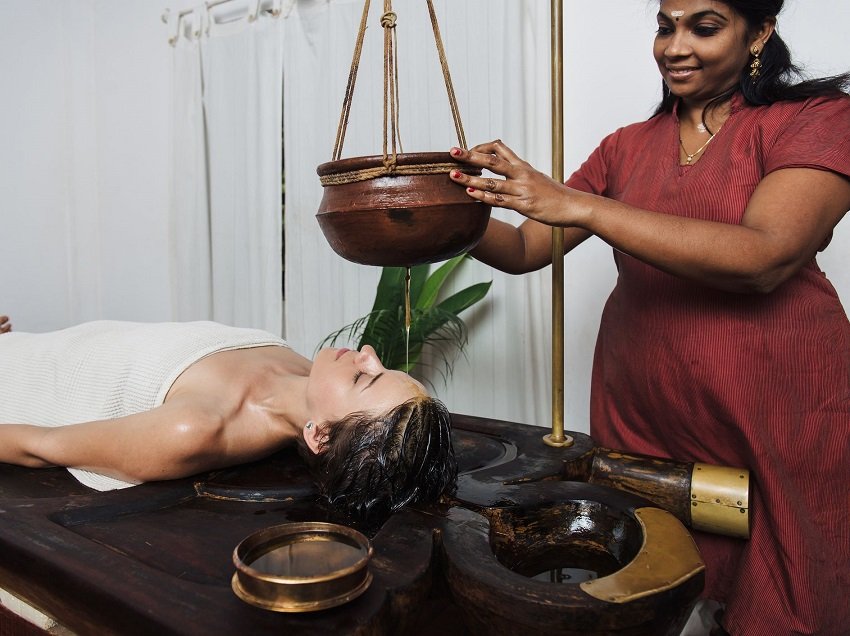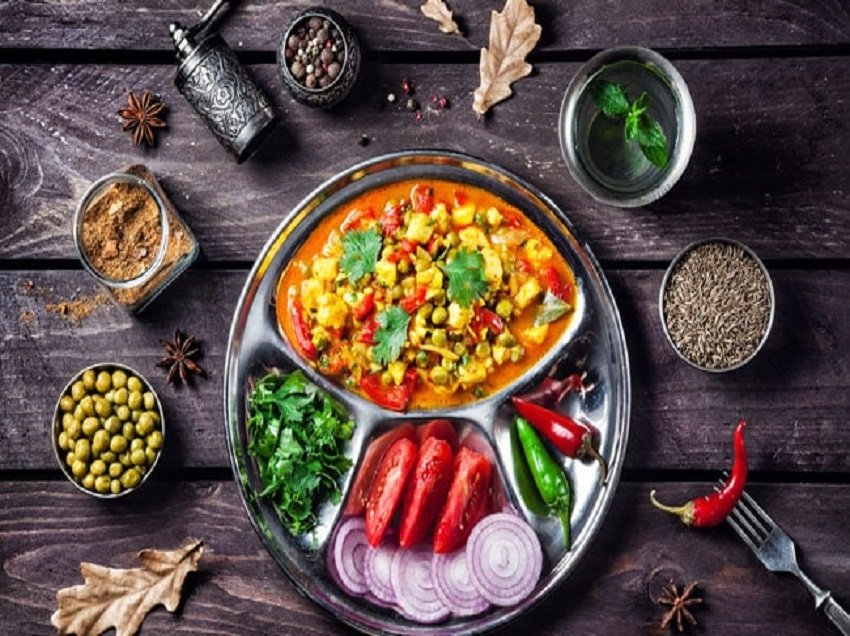
Om Mantra Healing Center provides participants with an overview of Ayurveda and its principles, as well as an introduction to the art of Ayurvedic cooking. This course is designed for individuals who are new to Ayurveda or want to explore the benefits of Ayurvedic cooking.
Throughout the course, participants will learn about the six tastes, the three doshas, and how to identify their own dosha type. They will also learn about the importance of balancing the doshas in each meal and how to use Ayurvedic herbs, spices, and ingredients to promote health and well-being.
The course includes both theoretical and practical components. Participants will attend lectures, participate in group discussions, and receive hands-on cooking demonstrations. They will also have the opportunity to practice cooking Ayurvedic recipes and learn how to modify recipes to cater to their individual dosha type.
Ayurvedic cooking is based on the principles of Ayurveda, a traditional system of medicine from India that emphasizes the importance of balancing the body, mind, and spirit to achieve optimal health and well-being.
The following are the basics of Ayurvedic cooking:
Balancing the six tastes: In Ayurvedic cooking, it's important to include all six tastes in each meal to promote balance and satisfaction. The six tastes are sweet, sour, salty, pungent, bitter, and astringent.
Catering to individual doshas: Ayurveda recognizes three doshas, or body-mind types, which are vata, pitta, and kapha. Each dosha has specific dietary recommendations, and Ayurvedic cooking aims to cater to individual doshas to promote balance and health.
Using fresh and natural ingredients: Ayurvedic cooking emphasizes the use of fresh and natural ingredients, such as fruits, vegetables, whole grains, and legumes, to promote optimal health and vitality.
Using Ayurvedic spices and herbs: Ayurvedic cooking uses a variety of spices and herbs, such as ginger, turmeric, cumin, and coriander, to enhance the flavor and nutritional value of the food and promote balance and healing.
Cooking techniques: Ayurvedic cooking includes a variety of cooking techniques, such as steaming, sautéing, and roasting, to retain the nutritional value and flavor of the food.
By incorporating these basic principles into your cooking, you can experience the benefits of Ayurvedic cooking and promote optimal health and well-being.
Ayurvedic cooking is a powerful way to support and promote health and well-being. By incorporating Ayurvedic principles into your cooking, you can experience the transformative benefits of this ancient system of medicine.
Here are some of the key benefits:
Promotes balance and harmony: Ayurvedic cooking emphasizes the use of fresh, natural ingredients, and spices and herbs that can help balance the body and mind. By incorporating Ayurvedic principles into cooking, you can support optimal health and well-being.
Supports digestion and nutrient absorption: Ayurvedic cooking makes use of ingredients and cooking methods that can help improve digestion and absorption of nutrients, which is essential for overall health.
Boosts immunity: Ayurvedic cooking includes a variety of herbs and spices that have immune-boosting properties. These ingredients can help support the immune system and protect against illness and disease.
Enhances mental clarity and calmness: Ayurvedic cooking can help improve mental clarity, focus, and calmness by nourishing the body and mind with healthy, balanced meals.
Promotes longevity: Ayurvedic cooking emphasizes the use of natural, whole foods that can help promote longevity and prevent chronic disease.
Helps manage weight: Ayurvedic cooking can help manage weight by promoting healthy digestion, reducing inflammation, and balancing hormones.
Nourishes the body and mind: Ayurvedic cooking is focused on nourishing the body and mind with whole, natural foods and herbs. This can help improve overall health and well-being, reduce stress and anxiety, and increase vitality.
5 Ayurvedic Principles for Cooking:
Ayurvedic cooking can be tailored to meet specific health needs and conditions, and can offer a holistic approach to promoting health and well-being.
Ayurvedic Cooking for Weight Loss
Ayurvedic cooking offers a holistic approach to weight loss, focusing on balancing the body's three doshas - Vata, Pitta, and Kapha - and supporting healthy digestion and metabolism. Ayurvedic cooking recommends incorporating whole, unprocessed foods, plenty of fresh vegetables and fruits, and healthy fats and proteins, while avoiding processed and refined foods, sugars, and artificial additives. It also emphasizes mindful eating, eating in a relaxed environment and savoring each bite. Some Ayurvedic recipes for weight loss include kitchari, a rice and lentil dish with digestive spices, vegetable soups with ginger and turmeric, and warm lemon water with honey and cinnamon. By following Ayurvedic principles in cooking and eating, individuals can support their body's natural balance and achieve sustainable weight loss.
Ayurvedic Cooking for Children
Ayurvedic cooking can be a fun and tasty way to help kids stay healthy! By using whole, unprocessed foods and digestive spices, avoiding processed foods, and encouraging mindful eating, Ayurvedic cooking can support children's overall well-being. Parents can also provide healthy snack options, such as fresh fruit and nuts, to keep kids fueled throughout the day.
Ayurvedic Cooking for Elderly
Ayurvedic cooking can be beneficial for the elderly by providing nourishing and easy-to-digest meals that support overall health and well-being. Ayurvedic principles recommend incorporating whole, unprocessed foods, digestive spices, and healthy fats and proteins while avoiding processed and refined foods, sugars, and artificial additives. Ayurvedic cooking also emphasizes mindful eating, eating in a relaxed environment and savoring each bite. For the elderly, it may be helpful to focus on foods that are easy to chew and swallow, such as cooked vegetables and soft grains. Additionally, incorporating warming spices like ginger and turmeric can help support digestion and boost immunity. Overall, Ayurvedic cooking can provide the elderly with delicious and nutritious meals that support their overall health and well-being.
Ayurvedic Cooking for Detoxification
Ayurvedic cooking can play a significant role in supporting the body's natural detoxification processes. The principles of Ayurveda recommend the use of whole, unprocessed foods, digestive spices, and herbal teas to help eliminate toxins from the body.
Incorporating Digestive Spices: Digestive spices like ginger, cumin, and coriander can help stimulate digestion and support the body's natural detoxification processes.
Eating Whole, Unprocessed Foods: Whole, unprocessed foods like fruits, vegetables, whole grains, and lean proteins can provide essential nutrients and support the body's natural detoxification processes.
Fasting or Cleansing: Ayurvedic fasting or cleansing practices can help support detoxification by giving the digestive system a break and allowing the body to focus on elimination.
Drinking Herbal Tea: Herbal teas like dandelion root, ginger, and fennel can help support the liver and promote detoxification.
Avoiding Processed Foods: Processed and refined foods can be difficult for the body to digest and eliminate, so Ayurvedic cooking emphasizes avoiding these types of foods during a detoxification period.
By following these tips, you can begin to learn the art of Ayurvedic cooking and incorporate its principles into your daily life for improved health and well-being.
Here are some tips for learning Ayurvedic cooking:
Start with the basics: Begin with the foundational principles of Ayurvedic cooking, such as using whole, unprocessed foods, incorporating digestive spices, and eating in a relaxed environment.
Invest in good resources: Look for reputable Ayurvedic cookbooks or online resources that provide authentic recipes and guidance.
Take a cooking class: Consider taking an Ayurvedic cooking class from a reputable teacher or institution to learn hands-on techniques and get personalized guidance.
Experiment in the kitchen: Don't be afraid to experiment with different recipes and ingredients to find what works best for you and your body.
Understand your body type: Ayurvedic cooking is tailored to individual body types or doshas. Understanding your dosha can help you choose foods and recipes that are best suited for your unique needs.
Be patient and consistent: Ayurvedic cooking is a lifestyle, not a quick fix. Be patient and consistent in your approach, and focus on making small, sustainable changes over time.
Om Mantra Healing Center has certain rules and guidelines in place for students who enroll in the Ayurvedic cooking course.
Here are some of the rules for learning Ayurvedic cooking course at Om Mantra Healing Center:
Follow safety guidelines: Students should follow safety guidelines while cooking, such as washing hands thoroughly before handling food and using proper utensils and equipment.
Follow the recipe: Students should follow the recipe provided by the teacher to ensure that the dish is prepared correctly and to get the maximum benefit from the Ayurvedic ingredients.
Be mindful of dietary restrictions: Students should inform the teacher of any dietary restrictions or allergies they may have so that appropriate accommodations can be made.
Arrive on time: Students should arrive on time to the class to avoid disruption and to ensure that they do not miss any important information.
Stay focused: Students should stay focused during the class and avoid any distractions that may interfere with their learning or the learning of others.
Clean up after yourself: Students should clean up after themselves after the class to ensure that the cooking area is left clean and tidy for the next class.
Following these rules and guidelines is essential to maintain a safe, respectful, and professional learning environment for all students at Om Mantra Healing Center.
Ayurvedic cooking is a type of cuisine that is based on the principles of Ayurveda, an ancient Indian system of medicine. It emphasizes using whole, unprocessed foods, incorporating digestive spices, and eating in a relaxed environment.
In an Ayurvedic cooking course, you can expect to learn about the foundational principles of Ayurvedic cooking, including the use of specific herbs and spices, how to choose foods based on your body type, and how to cook dishes that promote optimal digestion and health.
No, prior cooking experience is not necessary. Ayurvedic cooking courses are typically designed for beginners and may cover basic cooking techniques.
Ayurvedic cooking emphasizes using whole, unprocessed foods and choosing foods based on your body type or dosha. While there may not be any specific dietary restrictions, some recipes may not be suitable for certain dietary restrictions or allergies. It is always best to inform the instructor of any dietary restrictions or allergies beforehand.
The length of an Ayurvedic cooking course can vary depending on the specific center or institution offering the course. Some courses may be a few hours, while others may be a multi-day or multi-week program.

Professional and individual care by highly experienced and well-skilled Ayurvedic guru's.
Contact Us
Every aspect of your care is coordinated and teams of experts work together to provide exactly the care you need.
Contact Us
We serve healthy & fresh Ayurvedic food that suits your customized treatment plans to stimulate rejuvenation & health.
Contact Us